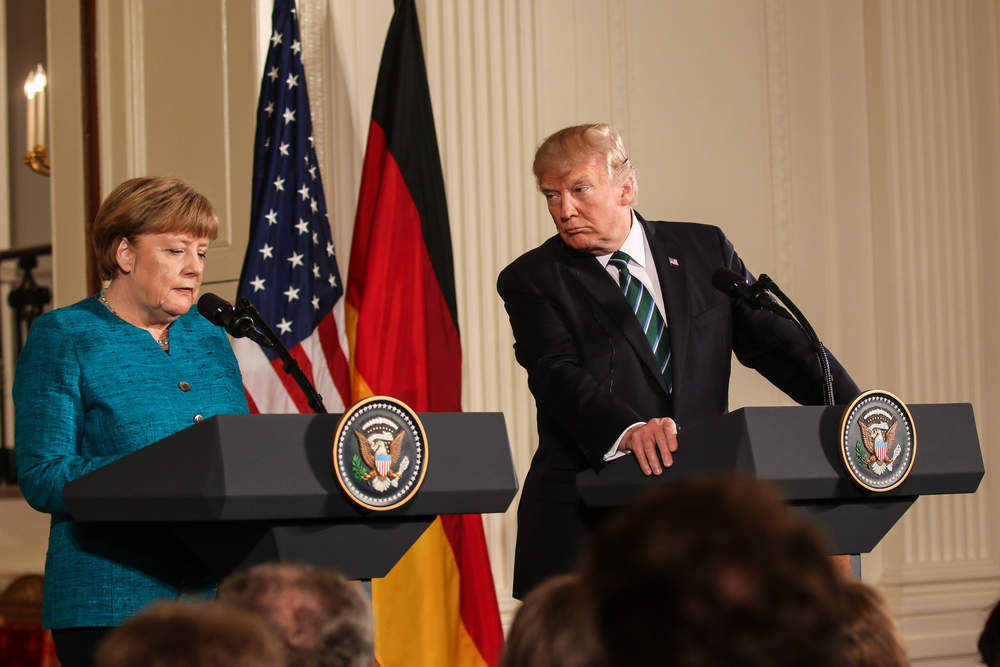
US President Donald Trump has given the European Union (EU), Canada, Mexico and other allies a 30-day reprieve from new steel and aluminium tariffs, delaying the controversial measures just days before a high-level delegation heads to China for trade discussions.
The move — which comes after lobbying from both the French President, Emmanuel Macron, and Chancellor Angela Merkel of Germany — means Washington can try to assemble a coalition to take on Beijing over its intellectual property practices.
However, tariffs are still set to take effect eventually unless there is a deal in the meantime. At the beginning of June British and European metals producers will be hit by 25% tariffs on steel and 10% on aluminium.
The extension only prolongs uncertainty for metals producers exporting to the US, the European Aluminium Association told Verdict.
The group’s communications director Maximo Miccinilli said:
European Aluminium, the voice of the entire aluminium value chain, regrets US decision to exempt Europe from the 10% tariff on aluminium products for only one month, starting today until the 1 June 2018.
How well do you really know your competitors?
Access the most comprehensive Company Profiles on the market, powered by GlobalData. Save hours of research. Gain competitive edge.
 Company Profile – free sample
Company Profile – free sampleThank you!
Your download email will arrive shortly
Not ready to buy yet? Download a free sample
We are confident about the unique quality of our Company Profiles. However, we want you to make the most beneficial decision for your business, so we offer a free sample that you can download by submitting the below form
By GlobalDataWhile the industry was requesting a permanent exclusion of tariffs, this short temporary extension provides no relief to the industry, which is already in a vulnerable state due to unsustainable increase of overcapacity in China in both the primary and semi-fabricated aluminium sectors.
Director General of European Aluminium, Dr. Gerd Götz added:
Unfortunately, the future of our strongly interlinked transatlantic value chains is still clouded in uncertainty. Our industry needs stability to fully benefit from the growing demand for aluminium for strategic applications in packaging, mobility, construction and the electrical sector.
We count on the EU Commission and the Member States to continue to work hard for a permanent exemption and take appropriate and commensurate safeguard measures if the prior surveillance proves an imports surge causing injury to our producers,” concluded Götz.
If a tit-for-tat trade war drags on without permanent exemptions, EU exporters also risk losing their share of the US market.
Miccinilli said:
The EU currently exports €1.2 billion euros of direct aluminium products to the US which we could risk losing.
The European industry also faces the risk of being harmed by a redirection of aluminium from third countries that are targeted by the tariffs.
This redirection could see an additional 35% of semi-fabricated aluminium products ending up in Europe.
Meanwhile, UK steelmakers have warned that 25% tariffs on steel imports could have a disastrous impact on the local steel industry. The industry is only just recovering from near-collapse after being flooded by cheap imports two years ago.
The European Steel Association (EUROFER) and European Aluminium were cautiously optimistic that the tariffs would be extended but said safeguard measures were in place just in case to prevent an oversupply of the market if exports were diverted from the US.
The spokesperson for the European Steel Association (EUROFER) Charles de Lusignan said:
The safeguard measure the EU is working on to guard against the injury caused by trade deflection/import surges should be broad and cover a wide scope of products but maintain access to traditional trade flows. It is important to stress that the safeguard – which remedies import surges – is independent of whether or not the US extends the exemption or not.
In June EU countries could also risk losing the US as a steel and aluminium export market, that rakes in €6.4 billion ($7.7 billion) a year, said Caroline Bain, chief commodities economist at Capital Economics.
It’s not going to have a big impact at all on the economies of the EU. On the steel and aluminium producers it would have a bigger impact.
It’s a reasonably sizeable market for EU producers. It’s the principle of it as it’s distorting world trade competitiveness, and the fear that it could spread to other sectors.
The US also relies heavily on EU imports of steel rods used in tyre manufacturing, prompting some countries to seek a specific exemption for steel rods, Bain said.
Analysts are doubtful the exemptions would be extended further and expected Trump and European Commissioners to return to the negotiating table.
Carsten Brzeski chief economist at ING financial consultants said:
The most likely way is they [the EU] will offer something in return by returning to the negotiating table. They single out a couple of sectors, and put the numbers on the table and offer the US better access to the European market.
Alternatively they could file an official complaint to the WTO.
EU countries were unlikely to retaliate by slapping tariffs on EU commodities, before seeking the approval of the WTO, he said.







